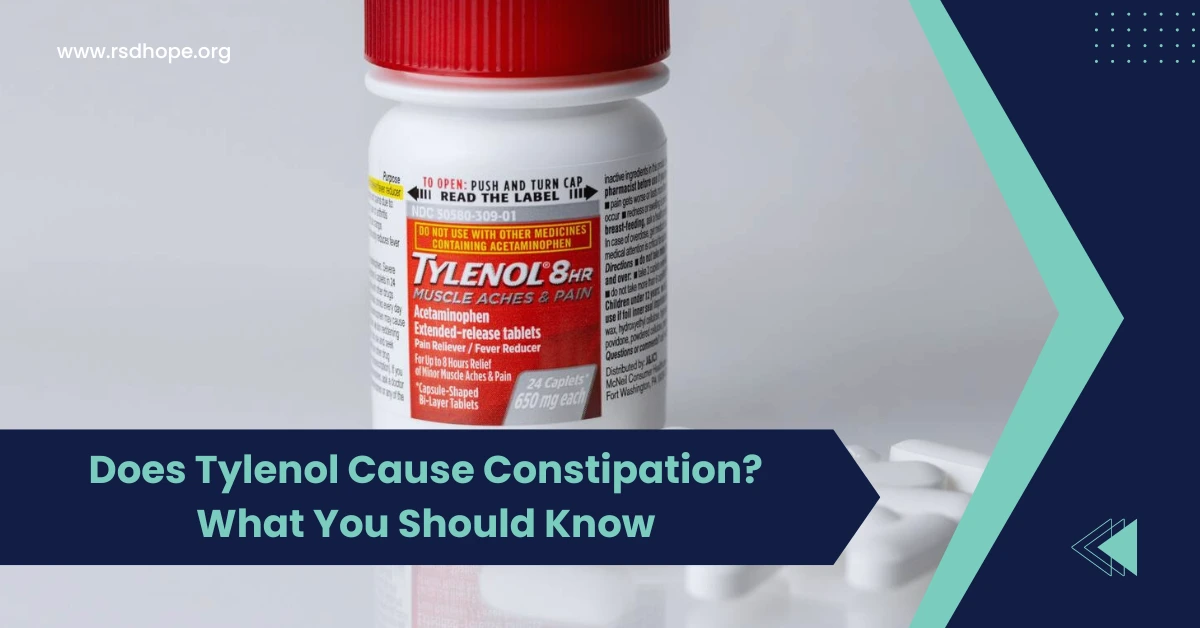Tylenol, the well-known brand name for acetaminophen, is a popular over-the-counter pain reliever and fever reducer. It’s often used to alleviate headaches, menstrual cramps, and various types of pain. While Tylenol is generally considered safe when used as directed, it can have side effects, including the possibility of constipation. So, does Tylenol cause constipation? Find out the answer in the upcoming sections of this article.
Key Takeaways
- Tylenol is generally safe but may cause side effects like constipation in some individuals.
- Higher doses or prolonged use of Tylenol increase the likelihood of experiencing constipation.
- Natural remedies and lifestyle changes can help alleviate constipation caused by medication.
Common Tylenol Side Effects
Like any medication, Tylenol can cause side effects, although not everyone experiences them. Some of the most common side effects include nausea, stomach pain, and loss of appetite. Constipation is a less common side effect but can still occur in some people who take Tylenol.
These side effects are usually mild and go away on their own. However, if they persist or become bothersome, it’s essential to consult a healthcare provider for guidance.
Also Read: Is Oatmeal Good For Constipation? The Ultimate Guide
Does Tylenol Cause Constipation?
While constipation is not the most common side effect of Tylenol, it can occur in some individuals. Tylenol can potentially cause constipation by slowing down the movement of the digestive system, which can lead to infrequent or difficult bowel movements.
The likelihood of experiencing constipation while taking Tylenol increases with higher doses or prolonged use. If you find yourself constipated after taking Tylenol, it’s important to speak with your healthcare provider to determine the best course of action.
Are All Tylenol Products Likely to Give You Constipation?
All Tylenol products contain the same active ingredient, acetaminophen, which can potentially cause constipation. However, some Tylenol formulations may have additional ingredients that could further contribute to constipation.
For example, Tylenol PM contains diphenhydramine, an antihistamine that can cause drowsiness and constipation. If you’re prone to constipation or have experienced it while taking Tylenol, it’s worth discussing alternative pain relief options with your healthcare provider.
How to Treat Constipation Caused by Medication Naturally?
If you experience constipation while taking Tylenol, there are several natural ways to find relief. Firstly, focus on increasing your fiber intake by eating more fruits, vegetables, and whole grains. Staying hydrated by drinking plenty of water throughout the day can also help keep things moving smoothly.
Regular physical activity, even gentle exercises like walking or yoga, can stimulate your digestive system and promote regular bowel movements. Incorporating probiotics, either through food sources like yogurt or supplements, may also help alleviate constipation.
If natural remedies don’t provide relief, over-the-counter stool softeners or laxatives may be an option. However, it’s crucial to speak with your healthcare provider before adding any new medications to your routine.
Conclusion
While Tylenol is a safe and effective pain reliever for most people, it can cause side effects, including constipation. Understanding the relationship between Tylenol and constipation can help you make informed decisions about your health.
If you experience persistent constipation or other concerning symptoms while taking Tylenol, don’t hesitate to reach out to your healthcare provider. They can help you find the best solution for your individual needs and ensure that you’re using Tylenol safely and effectively.
Read More: Can Antibiotics Cause Constipation? Exploring The Gut Health Connection
FAQs
A: Occasional use of Tylenol is less likely to cause constipation than regular, long-term use.
A: There are several other pain relief options available, such as ibuprofen or naproxen. Consult your healthcare provider for personalized recommendations.
A: The duration of constipation caused by Tylenol can vary. If symptoms persist, consult your healthcare provider.
A: It’s best to consult your healthcare provider before combining any medications, including laxatives and Tylenol.
References:
- U.S. National Library of Medicine. (2021). Acetaminophen. MedlinePlus. https://medlineplus.gov/druginfo/meds/a681004.html

